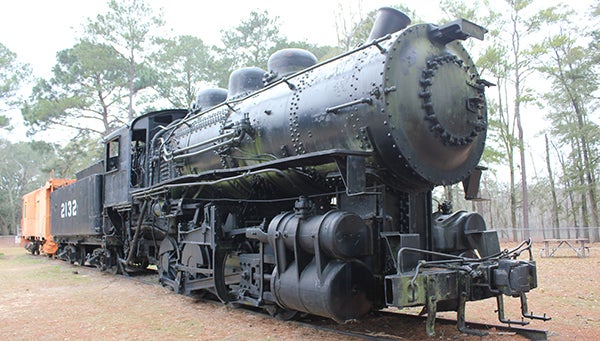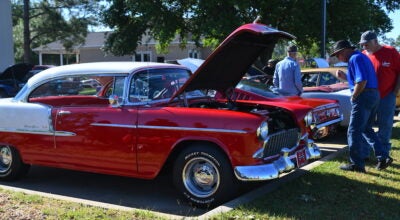Kentucky community requests return of Boat Basin train
Published 6:41 pm Friday, January 16, 2015

The steam engine at the Earle May Boat Basin was brought to Bainbridge around 30 years ago and has since become a part of the city’s landscape. — Shelby Farmer
Picnic tables. Flint River views. A “megaramp.” Nature trails.
An old steam engine. Billy goats. Various old machine parts. Emus.
“It’s all just a weird assortment of things that the city over the years has just come to acquire,” City Manager Chris Hobby said on the collection of items found at the Earle May Boat Basin. “It’s just this hodgepodge collection of stuff that I guess has kind of become part of Bainbridge over the years. It’s one of our little quirks.”
Some of the pieces have a clearer history than others. Hobby knows that the emus were acquired after the flood of 1994 when their owner needed help saving them, and he knows former Bainbridge Mayor Bill Reynolds was responsible for adding the steam engine and caboose to the area.
The train was added to the Boat Basin some time during the late 1970s or early 1980s, said Bainbridge Leisure Services director Al Kelley, who worked for the city during the time.
“At the time we thought the mayor was crazy,” Kelley said. “We went and looked at it and said, ‘We can’t move this thing,’ but he was determined to have it in Bainbridge.”
It took every piece of city equipment that had any lifting capabilities, a local steam engine enthusiast and cutting the train into pieces to move the steam engine from Sneads, Florida, 30 miles to Bainbridge.
“I want to say we moved it in five pieces,” Kelley said. “We moved the engine in two parts, the chassis, the caboose and the chassis to the caboose.”
The move, while dangerous and heavy, went smoothly, Kelley said. City staff had laid some track down at the Boat Basin, and they pieced the engine back together.
“At the time, it was probably too heavy to haul on the road, but we did it anyway. Coming across the bridges, it was probably overweight.”
Now more than 30 years later, a tourism board located in Corbin, Kentucky wants that steam engine.
“I know that the train operated in the Corbin area when it was new and that trains are a big part of their history,” Hobby said. “They are trying to develop a museum that will accentuate their history and the tie-in to the trains, and that’s what led them to us.”
According to railga.com, a website that traces the history of trains in Georgia, “The 0-8-0 switch engine was built in 1922 by the [Louisville & Nashville Railroad] mechanical department at its South Louisville shops. In 1951, it was sold to Gulf Power Company, which used it for switching duties at a power plant on the Apalachicola River a few miles south of Chattahoochee, Florida. After years of neglect it was moved to Bainbridge for display.”
The tourism group in Corbin contacted Hobby a few months ago to see if the city would be willing to talk about giving the train up.
“My initial reaction was, ‘No, that wouldn’t be something we’d want to talk about; it’s our train,’” Hobby said.
After thinking about it a little bit and inspecting the train, Hobby said he changed his mind because of the state of the train after years of exposure to the elements.
“It’s in pretty bad shape, and it’s going to need a lot of work if it’s going to stay displayed as it is,” Hobby said.
The Corbin tourism group is committed to restoring the engine, Hobby said.
“I know it’s been here a long time, but there really isn’t any historical significance to it for here,” Hobby said. “It means an awful lot to the people in Corbin, and they are committed to restoring it and having it on display as part of their community’s history. So what’s the right thing to do? I know if the roles were reversed, we’d certainly want to hold on to our history, which is all they want to do.”
Ultimately, the decision will be left to the Bainbridge City Council because the train is city property. The Council expects to hear a presentation from the Corbin tourism group at its meeting on Tuesday, Jan. 20.





